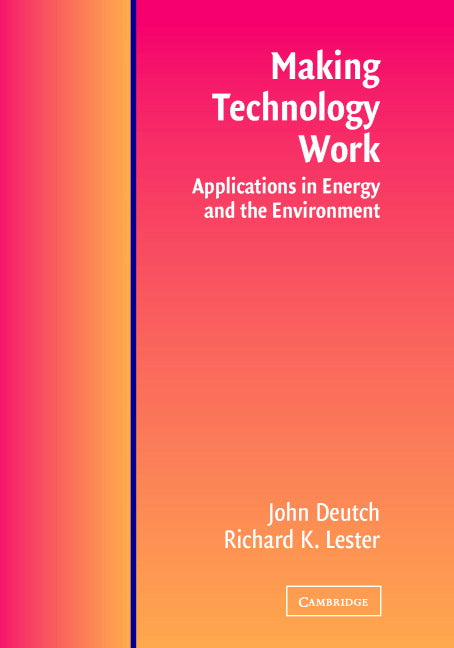Freshly Printed - allow 8 days lead
Couldn't load pickup availability
Making Technology Work
Applications in Energy and the Environment
This book presents 15 interdisciplinary case studies of technology application in the energy and environment sectors.
John M. Deutch (Author), Richard K. Lester (Author)
9780521818575, Cambridge University Press
Hardback, published 10 November 2003
282 pages, 87 b/w illus. 43 tables
26.2 x 18.2 x 2.6 cm, 0.766 kg
This book presents fifteen cases of technology applications in the energy and environment sectors, including solar, wind, fuel cell, nuclear, coal combustion and emission control technologies. The case studies demonstrate the importance of an interdisciplinary approach, integrating technical and non-technical aspects of the problem. They also introduce a toolbox of analytical techniques useful in the context of realistic technology application. These techniques include energy and mass balances, project financial analysis tools, treatment of external costs and benefits, probabilistic risk assessment, learning curves, regression analysis, and life cycle costing. Each case study presents a description of the relevant technology at a level accessible to anyone familiar with elementary concepts in basic science and engineering. The book is addressed to upper-level undergraduate students in the natural sciences, engineering and the social sciences who are interested in learning about problems of technology application, as well as technology practitioners in industry and government.
1. Introduction
2. Gasohol
3. Solar thermal, windpower and photovoltaic technologies
4. Electricity from coal
5. Controlling acid rain from coal-fired power plants
6. Greenhouse gases and global warming
7. Nuclear power and its fuel cycle
8. Managing nuclear waste
9. Nuclear power and weapons proliferation
10. Natural gas
11. Safety and risk: examples from the liquefied natural gas and nuclear industries
12. Synthetic fuels
13. Fuel cells for automobiles
14. Energy models and statistics
15. The government's role in innovation
16. Conclusions.
Subject Areas: Environmental science, engineering & technology [TQ], Engineering: general [TBC], Economics [KC]


